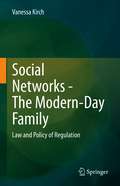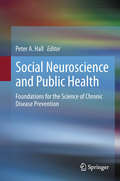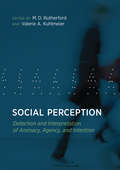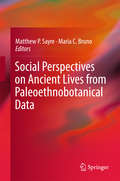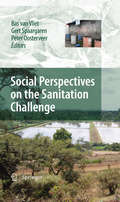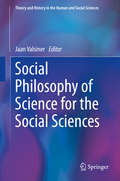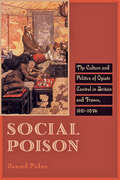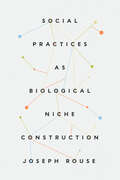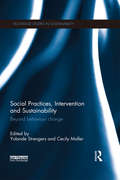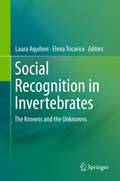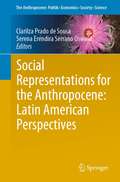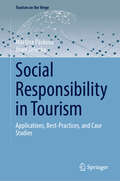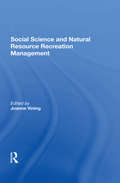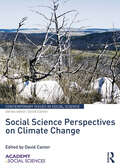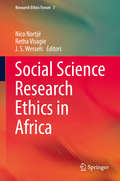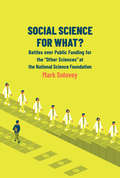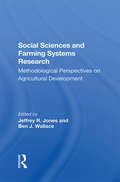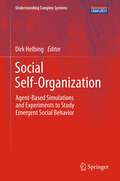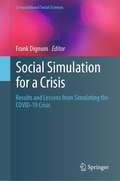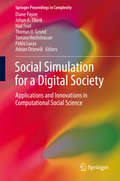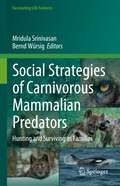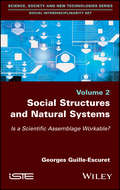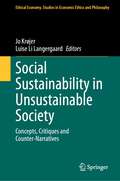- Table View
- List View
Social Networks - The Modern-Day Family: Law and Policy of Regulation
by Vanessa KirchSocial networks have created a plethora of problems regarding privacy and the protection of personal data. The use of social networks has become a key concern of legal scholars, policy-makers and the operators as well as users of those social networks. This pathbreaking book highlights the importance of privacy in the context of today's new electronic communication technologies as it presents conflicting claims to protect national and international security, the freedom of the Internet and economic considerations. Using the New Haven School of Jurisprudence's intellectual framework, the author presents the applicable law on privacy and social media in international and comparative perspective, focusing on the United States, the European Union and its General Data Protection Regulation of 2018 as well as Germany, the United Kingdom and Latin America. The book appraises the law in place, discusses alternatives and presents recommendations in pursuit of a public order of human dignity.
Social Neuroscience and Public Health: Foundations for the Science of Chronic Disease Prevention
by Peter A. HallThe field of public health is primarily concerned with understanding and improving physical health from a large group perspective (i.e., communities and whole populations). The field of social neuroscience, on the other hand, is primarily concerned with examining brain-behavior relationships that unfold in a social context. Both of these are rapidly developing fields of inquiry, and their boundaries have only recently begun to overlap. This book discusses collaborative research findings at the intersection of social neuroscience and public health that promise to fundamentally change the way scientists, public health practitioners, and the general public view physical health within the larger social context. Eighteen chapters are organized under the following major sections: cognition and health outcomes; neuroscientific aspects of health communication; health behavior and the neurobiology of self-regulation; neurobiological processes in health decision making; ecological and social context; neuroscience methods; and future directions.
Social Neuroscience: Brain, Mind, and Society
by Matcheri S. Keshavan Russell K. Schutt Larry J. SeidmanHuman beings evolved in the company of others and flourish in proportion to their positive social ties. To understand the human brain, we must situate its biology in the wider context of society. To understand society, we must also consider how the brains and minds of individuals shape interactions with other human beings. Social Neuroscience offers a comprehensive new framework for studying the brain, human development, and human behavior. <P><P> In this book, leading researchers in the fields of neurobiology, psychiatry, psychology, and sociology elucidate the connections between brain biology and the brain’s functioning in the social world, providing a state-of-the-art interdisciplinary explanation of how humans think and act, as well as the ways we define and treat pathological behavior. Synthesizing the insights and perspectives of these experts, Social Neuroscience examines how neural processes make the brain sensitive to social experience, how cognition shapes social behavior, and how social networks create a range of responses among different individuals to the same environmental stimuli. <P> The mutually reinforcing connections between brain, mind, and society have profound implications for human health, from the emotionally damaging effects of severe social deprivation to the neurological impact of parental abuse and neighborhood violence. The authors explore these connections, with special focus on mental illnesses, including schizophrenia―a disorder characterized by marked social deficits in which a neurological basis is now well established.
Social Perception: Detection and Interpretation of Animacy, Agency, and Intention (The\mit Press Ser.)
by Valerie A. Kuhlmeier M. D. RutherfordAn interdisciplinary exploration of perceptual and cognitive processes underlying the ability to perceive social information, drawing on current research and new experimental techniques.As we enter a room full of people, we instantly have a number of social perceptions. We have an automatic perception of others as subjective agents with their own points of view, thoughts, and goals, and we can quickly interpret minimal visual information to infer that something is animate. This book explores the perceptual and cognitive processes that allow humans to perceive and understand this social information quickly and apparently effortlessly. Top researchers in fields ranging from developmental psychology to vision science consider the perception of biological and animate motion, inferences based on this motion, and the early development of these abilities. These innovative contributions reflect a recent renewal of interest in the attribution of agency and the understanding of goal-directed behavior, which has been accompanied by a rapid increase in empirical discoveries enabled by such new experimental techniques as brain imaging. The research presented in Social Perception suggests that an intuitive understanding of others is an integral part of human psychology, develops early, relies on a network of brain regions, and may be compromised in autism.ContributorsDare Baldwin, Lara Bardi, H. Clark Barrett, Erin Cannon, You-jung Choi, Willem E. Frankenhuis, Tao Gao, Emily D. Grossman, Antonia Hamilton, Petra Hauf, Valerie A. Kuhlmeier, Jeff Loucks, Scott A. Love, Yuyan Luo, Elena Mascalzoni, Phil McAleer, Richard Ramsey, Lucia Regolin, M.D. Rutherford, Kara Sage, Brian J. Scholl, Maggie Shiffrar, Francesca Simion, Jessica Sommerville, James P. Thomas, Nikolaus Troje, Amanda Woodward
Social Perspectives on Ancient Lives from Paleothnobotanical Data
by Matthew P. Sayre Maria C. BrunoThis volume contributes to the emerging topic of social paleoethnobotany with a series of papers exploring dynamic aspects of past social life, particularly the day-to-day practices and politics of procuring, preparing, and consuming plants. The contributors to this volume illustrate how one can bridge differences between the natural and social sciences through the more socially-focused interpretations of botanical datasets. The chapters in this volume draw on a diversity of plant-derived datasets, macrobotanical, microbotanical, and molecular, which contribute to general paleoethnobotanical practice today. They also carefully consider the contexts in which the plant remains were recovered. These studies illustrate that the richest interpretations come from projects that are able to consider the widest range of data types, particularly as they aim to move beyond simple descriptions of food items and environmental settings. The authors in this volume address several themes including: the collection of wild resources, the domestication of crops and spread of agriculture, the role of plant remains in questions regarding domestic life, ritual, and gender as well as the broader implications of a socially-engaged paleoethnobotany. These studies point a path forward for the constantly evolving field of paleoethnobotany, one that is methodologically rigorous and theoretically engaged. Together, these papers shed light on ways in which the specialized analysis of plant remains can contribute to theory building and advancing archaeological understanding of past lifeways.
Social Perspectives on the Sanitation Challenge
by Gert Spaargaren Peter Oosterveer Bas Van VlietThis collection presents a timely collection of social scientific papers dealing with innovative sanitation issues and concepts, perceptions and decision-making support. It comprises a valuable resource for political scientists, environmental engineers and urban planners involved in the study, design and implementation of sanitation projects worldwide and whose work relates to meeting the ambitious Millennium Development Goal of halving, by 2015, the number of people without sustainable access to safe drinking water and basic sanitation. In developed countries the sanitation challenge is to initiate a transition from strongly centralized, water-based infrastructure regimes towards more sustainable, source-separation oriented, sanitation regimes. This calls for social scientific research and demonstration on different levels and scales, including concept development, institutional learning and governance building. In the developing world the sanitation challenge is to provide sanitation services to the poor and the very poor, without compromising on sustainability. New configurations employing the best practices of sanitation technology and management for rural and urban contexts are needed. The sanitation challenge in both worlds is to go beyond traditional dichotomies between 'small, appropriate' and 'modern/advanced' technologies and to develop rural and urban sanitation with a mix of scales, strategies, technologies, payment systems and decision-making structures, that better fit the physical and human systems for which they are designed. This volume is unique in its presentation of social scientific research findings from urban planners, sociologists, economists, political scientists and environmental engineers who are involved in international sanitation research and implementation. Theoretically the volume include insights from Science and Technology Studies, Environmental Sociology and Urban Studies. Its empirical scope stretches from sanitation projects in Western Europe to Sub-Saharan Africa.
Social Philosophy of Science for the Social Sciences (Theory and History in the Human and Social Sciences)
by Jaan ValsinerThis is an international and interdisciplinary volume that provides a new look at the general background of the social sciences from a philosophical perspective and provides directions for methodology. It seeks to overcome the limitations of the traditional treatises of a philosophy of science rooted in the physical sciences, as well as extend the coverage of basic science to intentional and socially normative features of the social sciences. The discussions included in this book are divided into four thematic sections: Social and cognitive roots for reflexivity upon the research process Philosophies of explanation in the social sciences Social normativity in social sciences Social processes in particular sciences Social Philosophy of Science for the Social Sciences will find an interested audience in students of the philosophy of science and social sciences. It is also relevant for researchers and students in the fields of psychology, sociology, economics, anthropology, education, and political science.
Social Physics
by Alex PentlandFrom one of the world’s leading data scientists, a landmark tour ofthe new science of idea flow, offering revolutionary insights into the mysteries of collective intelligence and social influence If the Big Data revolution has a presiding genius, it is MIT’s Alex "Sandy” Pentland. Over years of groundbreaking experiments, he has distilled remarkable discoveries significant enough to become the bedrock of a whole new scientific field: social physics. Humans have more in common with bees than we like to admit: We’re social creatures first and foremost. Our most important habits of action-and most basic notions of common sense-are wired into us through our coordination in social groups. Social physics is about idea flow, the way human social networks spread ideas and transform those ideas into behaviors. Thanks to the millions of digital bread crumbs people leave behind via smartphones, GPS devices, and the Internet, the amount of new information we have about human activity is truly profound. Until now, sociologists have depended on limited data sets and surveys that tell us how people say they think and behave, rather than what they actually do. As a result, we’ve been stuck with the same stale social structures-classes, markets-and a focus on individual actors, data snapshots, and steady states. Pentland shows that, in fact, humans respond much more powerfully to social incentives that involve rewarding others and strengthening the ties that bind than incentives that involve only their own economic self-interest. Pentland and his teams have found that they can study patterns of information exchange in a social network without any knowledge of the actual content of the information and predict with stunning accuracy how productive and effective that network is, whether it’s a business or an entire city. We can maximize a group’s collective intelligence to improve performance and use social incentives to create new organizations and guide them through disruptive change in a way that maximizes the good. At every level of interaction, from small groups to large cities, social networks can be tuned to increase exploration and engagement, thus vastly improving idea flow. Social Physics will change the way we think about how we learn and how our social groups work-and can be made to work better, at every level of society. Pentland leads readers to the edge of the most important revolution in the study of social behavior in a generation, an entirely new way to look at life itself. .
Social Poison: The Culture and Politics of Opiate Control in Britain and France, 1821–1926
by Howard PadwaThis comparative history examines the divergent paths taken by Britain and France in managing opiate abuse during the late nineteenth and early twentieth centuries.Though the governments of both nations viewed rising levels of opiate use as a problem, Britain and France took opposite courses of action in addressing the issue. The British sanctioned maintenance treatment for addiction, while the French authorities did not hesitate to take legal action against addicts and the doctors who prescribed drugs to them. Drawing on primary documents, Howard Padwa examines the factors that led to these disparate approaches. He finds that national policies were influenced by shifts in the composition of drug-using populations of the two countries and a marked divergence in British and French conceptions of citizenship. Beyond shared concerns about public health and morality, Britain and France had different understandings of the threat that opiate abuse posed to their respective communities. Padwa traces the evolution of thinking on the matter in both countries, explaining why Britain took a less adversarial approach to domestic opiate abuse despite the productivity-sapping powers of this social poison, and why the relatively libertine French chose to attack opiate abuse. In the process, Padwa reveals the confluence of changes in medical knowledge, culture, politics, and drug-user demographics throughout the period, a convergence of forces that at once highlighted the issue and transformed it from one of individual health into a societal concern.An insightful look at the development of drug discourses in the nineteenth century and drug policy in the twentieth century, Social Poison will appeal to scholars and students in public health and the history of medicine.
Social Practices as Biological Niche Construction
by Joseph RouseA broad, synthetic philosophy of nature focused on human sociality. In this book, Joseph Rouse takes his innovative work to the next level by articulating an integrated philosophy of society as part of nature. He shows how and why we ought to unite our biological conception of human beings as animals with our sociocultural and psychological conceptions of human beings as persons and acculturated agents. Rouse’s philosophy engages with biological understandings of human bodies and their environments as well as the diverse practices and institutions through which people live and engage with one another. Familiar conceptual separations of natural, social, and mental “worlds” did not arise by happenstance, he argues, but often for principled reasons that have left those divisions deeply entrenched in contemporary intellectual life. Those reasons are eroding in light of new developments across the disciplines, but that erosion has not been sufficient to produce more adequately integrated conceptual alternatives until now. Social Practices and Biological Niche Construction shows how the characteristic plasticity, plurality, and critical contestation of human ways of life can best be understood as evolved and evolving relations among human organisms and their distinctive biological environments. It also highlights the constitutive interdependence of those ways of life with many other organisms, from microbial populations to certain plants and animals, and explores the consequences of this in-depth, noting, for instance, how the integration of the natural and social also provides new insights on central issues in social theory, such as the body, language, normativity, and power.
Social Practices, Intervention and Sustainability: Beyond behaviour change (Routledge Studies in Sustainability)
by Yolande Strengers Cecily MallerIn an era of dramatic environmental change, social change is desperately needed to curb burgeoning consumption. Many calls to action have focused on individual behaviour or technological innovation, with relative silence from the social sciences on other modes and methods of intervening in social life. This book shows how we can go beyond behaviour change in the pursuit of sustainability. Inspired by the ‘practice turn’ in consumption studies, this interdisciplinary book looks through the lens of social practice theory to explore important and timely questions about how to intervene in social life. It discusses a range of applied sustainability topics including energy consumption, housing provision, water demand, transport, climate change, curbside recycling and smart grids, seeking to redefine what intervention is, how it happens, and who or what can intervene to address the growing list of environmental calamities facing contemporary societies. These issues are explored through a range of specific case studies from Australia, the UK and the US, providing theoretical insights that are of international relevance. The book will be of interest to researchers and students in the fields of sociology, consumption studies, environmental studies, geography, and science and technology studies, as well as policy makers and practitioners seeking to intervene in social life for sustainability.
Social Recognition in Invertebrates
by Laura Aquiloni Elena TricaricoThis book uses a wide range of case studies from different invertebrate taxa to describe the numerous forms of social recognition occurring in this large group of animals and traces the evolution of this cognitive ability. The authors provide several examples of direct (i. e. the target of recognition is a conspecific) and indirect recognition (i. e. recognition of a reliable proxy rather than an individual, such as a den or a substrate) and discuss cases of familiar recognition (i. e. an animal remembers a conspecific but cannot tell what class it comes from or recognize its identity). Class-level recognition (i. e. an animal assigns a conspecific to an appropriate class of animals), and true individual recognition (i. e. an animal both identifies and recognizes a conspecific on an individual basis) are also addressed.
Social Representations for the Anthropocene: Latin American Perspectives (The Anthropocene: Politik—Economics—Society—Science #32)
by Serena Eréndira Serrano Oswald Clarilza Prado de SousaThe Anthropocene has become a field of studies in which the influence of human activity on the Earth System and nature is both the main threat and the potential solution. Social Representations Theory has been evolving since the 1960s.It links knowledge and practice in everyday life and is an effective way to deal with systemic crises based on common sense. This book assembles key contributions by Latin American scholars working with social representations in the social sciences that are of conceptual relevance to the study of the Anthropocene and that investigate the societal consequences of complex interrelations between common sense and topics of global relevance, such asthe contradictions of sustainable development, the construction of risks beyond risk-perception, health, negotiation and governance in the field of education, gender equality, the usefulness of longitudinal and systemic ethnography and case studies, and agency and the link between inequality, crises and risk society in the context of COVID-19, presenting theoretical and methodological innovations fromSpanish, Portuguese and Frenchresearchthat have rarely been available in English. • This is the first book to address the relevance of Social Representations Theory for the Anthropocene as a societal era• It presents the multidisciplinary scope of Social Representations• This book covers emerging research contributions in Social Representations Theory from Latin America• This book presents innovative research and commentaries by established researchers in the field• This multidisciplinary book should be in the libraries of many disciplines in the social sciences and humanities
Social Responsibility in Tourism: Applications, Best-Practices, and Case Studies (Tourism on the Verge)
by Martina Pásková Josef ZelenkaThis monograph offers a comprehensive examination of responsible tourism, meticulously deconstructing the core tenets of socio-cultural, environmental, and economic accountability within the framework of sustainable tourism. The work underscores the intrinsic significance of local attributes, emphasizing their pivotal role in shaping responsible practices. Guiding through the intricate terrain of challenges and opportunities inherent in integrating responsible paradigms within the dynamic tourism sector, the authors introduce a prescriptive implementation framework. This framework steers tourism stakeholders towards equilibrium, enabling present actions to safeguard and augment conditions for sustainable future development. Rooted in scholarly depth, augmented by synoptic diagrams and references to supplementary resources, the book converges into an analysis of concrete instances—illustrative case studies, products, and applications—demonstrating the embodiment of social responsibility in tourism's fabric. By spotlighting both successful and adverse examples, the monograph underscores the vital interplay of environmental, economic, and socio-cultural dimensions, encapsulating the essence of responsible tourism's enduring impact.
Social Science And Natural Resource Recreation Management
by Joanne ViningThis book deals with the interaction of various social groups, and the extent to which they may or may not conflict. It focuses on the interface between the various publics related to recreation, including recreationists themselves.
Social Science Perspectives on Climate Change (Contemporary Issues in Social Science)
by David CanterAlthough it is generally accepted that the climate is changing for the worse and that human activities are a major contributing factor in that change, there is still only marginal response to the challenge posed by climate change. The reasons behind this limited response are becoming clearer through the recognition that climate change is not just a set of physical science facts, but it is also part of a series of complex social processes. Consequently, this book is important in providing social science perspectives on a range of attempts to adjust human activity to reduce its environmental impact. These attempts vary from the changing of the dress code in Japanese offices to the creation of zero-carbon, gated communities in Bangalore, India. Taken together, the contributions to this book provide timely insights into the complexities of saving the planet through human endeavour. This book was originally published as a special issue of Contemporary Social Science.
Social Science Research Ethics in Africa (Research Ethics Forum #7)
by Nico Nortjé Retha Visagie J. S. WesselsThis book gives a voice to debates surrounding social science research ethics in Africa and brings them together in a coherent form to assist readers in being at the forefront of the discussions. The book gives an overview of the importance of research ethics in social sciences, as well as articulating the African influence on the subject matter. Subsequently it looks into specific frameworks and tools that researchers can apply in the process of doing research. Last but not least it also takes an in-depth look at traditional ethical issues pertaining to research in social sciences, through the lens of the African continent. This is the first book on social science research ethics in an African context and an indispensable resource for researchers, students, policy makers and research institutions in or interested in African research ethics.
Social Science for What?: Battles over Public Funding for the "Other Sciences" at the National Science Foundation
by Mark SoloveyHow the NSF became an important yet controversial patron for the social sciences, influencing debates over their scientific status and social relevance.In the early Cold War years, the U.S. government established the National Science Foundation (NSF), a civilian agency that soon became widely known for its dedication to supporting first-rate science. The agency's 1950 enabling legislation made no mention of the social sciences, although it included a vague reference to "other sciences." Nevertheless, as Mark Solovey shows in this book, the NSF also soon became a major--albeit controversial--source of public funding for them.
Social Sciences And Farming Systems Research: Methodological Perspectives On Agricultural Development
by Robert Booth Jeffrey R Jones Ben J Wallace Robert E RhoadesThe publication of this book has required the cooperation of many people along the way. From its very conception, the project of bringing together experiences from ongoing Farming Systems Research projects has faced a problem of communication due to the dispersal of the participants. Dr. William Partridge and Lynne Goldstein were instrumental in the initial presentation of the symposium on Social Science participation in Farming Systems Research at the 83rd Annual Meeting of the American Anthropological Association. Ben Wallace has done an admirable job not only as editor but 8s a ilpoint m-an"- throughout the process or organizirig the conference and preparing the manuscript. He deserves credit tor expediting countless actMties that could never have otherwise been accomplished because of the vagaries or international mails and telecommunications.
Social Self-Organization
by Dirk HelbingWhat are the principles that keep our society together? This question is even more difficult to answer than the long-standing question, what are the forces that keep our world together. However, the social challenges of humanity in the 21st century ranging from the financial crises to the impacts of globalization, require us to make fast progress in our understanding of how society works, and how our future can be managed in a resilient and sustainable way. This book can present only a few very first steps towards this ambitious goal. However, based on simple models of social interactions, one can already gain some surprising insights into the social, ``macro-level'' outcomes and dynamics that is implied by individual, ``micro-level'' interactions. Depending on the nature of these interactions, they may imply the spontaneous formation of social conventions or the birth of social cooperation, but also their sudden breakdown. This can end in deadly crowd disasters or tragedies of the commons (such as financial crises or environmental destruction). Furthermore, we demonstrate that classical modeling approaches (such as representative agent models) do not provide a sufficient understanding of the self-organization in social systems resulting from individual interactions. The consideration of randomness, spatial or network interdependencies, and nonlinear feedback effects turns out to be crucial to get fundamental insights into how social patterns and dynamics emerge. Given the explanation of sometimes counter-intuitive phenomena resulting from these features and their combination, our evolutionary modeling approach appears to be powerful and insightful. The chapters of this book range from a discussion of the modeling strategy for socio-economic systems over experimental issues up the right way of doing agent-based modeling. We furthermore discuss applications ranging from pedestrian and crowd dynamics over opinion formation, coordination, and cooperation up to conflict, and also address the response to information, issues of systemic risks in society and economics, and new approaches to manage complexity in socio-economic systems. Selected parts of this book had been previously published in peer reviewed journals.
Social Simulation for a Crisis: Results and Lessons from Simulating the COVID-19 Crisis (Computational Social Sciences)
by Frank DignumSimulating for a crisis is far more than creating a simulation of a crisis situation. In order for a simulation to be useful during a crisis, it should be created within the space of a few days to allow decision makers to use it as quickly as possible. Furthermore, during a crisis the aim is not to optimize just one factor, but to balance various, interdependent aspects of life. In the COVID-19 crisis, decisions had to be made concerning e.g. whether to close schools and restaurants, and the (economic) consequences of a 3 or 4-week lock-down had to be considered. As such, rather than one simulation focusing on a very limited aspect, a framework allowing the simulation of several different scenarios focusing on different aspects of the crisis was required. Moreover, the results of the simulations needed to be easily understandable and explainable: if a simulation indicates that closing schools has no effect, this can only be used if the decision makers can explain why this is the case. This book describes how a simulation framework was created for the COVID-19 crisis, and demonstrates how it was used to simulate a wide range of scenarios that were relevant for decision makers at the time. It also discusses the usefulness of the approach, and explains the decisions that had to be made along the way as well as the trade-offs. Lastly, the book examines the lessons learned and the directions for the further development of social simulation frameworks to make them better suited to crisis situations, and to foster a more resilient society.
Social Simulation for a Digital Society: Applications and Innovations in Computational Social Science (Springer Proceedings in Complexity)
by Johan A. Elkink Diane Payne Nial Friel Thomas U. Grund Tamara Hochstrasser Pablo Lucas Adrian Ottewill“Social Simulation for a Digital Society” provides a cross-section of state-of-the-art research in social simulation and computational social science. With the availability of big data and faster computing power, the social sciences are undergoing a tremendous transformation. Research in computational social sciences has received considerable attention in the last few years, with advances in a wide range of methodologies and applications. Areas of application of computational methods range from the study of opinion and information dynamics in social networks, the formal modeling of resource use, the study of social conflict and cooperation to the development of cognitive models for social simulation and many more. This volume is based on the Social Simulation Conference of 2017 in Dublin and includes applications from across the social sciences, providing the reader with a demonstration of the highly versatile research in social simulation, with a particular focus on public policy relevance in a digital society. Chapters in the book include contributions to the methodology of simulation-based research, theoretical and philosophical considerations, as well as applied work. This book will appeal to students and researchers in the field.
Social Strategies of Carnivorous Mammalian Predators: Hunting and Surviving as Families (Fascinating Life Sciences)
by Bernd Würsig Mridula SrinivasanThe book offers a comparative look at the social strategies of five carnivorous social predators (four terrestrial and one marine) that make them successful hunting units. The focus is on mammalian predators hunting (largely) mammalian prey. Each chapter (with separate authors) devoted to a particular species, explores the versatile hunting techniques and social dynamics of these top predators as they attempt to survive, defend, and reproduce in challenging habitats. Each chapter also delves into how the social fabric and ecology of each species influence their ability to deal with natural and man-made threats and shifting baselines.
Social Structures and Natural Systems: Is a Scientific Assemblage Workable?
by Georges Guille-EscuretTrapped between the caricatured causalities of biological determinism and the sinister abdications of sociological relativism, socio-ecological interdisciplinarity stagnates. It has lost sight of the ambition of a long-term program and no longer works to conduct applied research on the concrete prerequisites for reliable cooperation, despite an accumulation of emergencies. The difficulty lies in the general and prolonged abandonment of necessary procedures under the influence of hidden philosophical presumptions. In the end, ecology, sociology, history, economics, agronomy, etc. are seriously handicapped by the absence of a common epistemology of comparative practice, an absence maintained by the dominant epistemology itself. Social Structures and Natural Systems seeks to demonstrate, with regard to social anthropology and ecology, a scientific compatibility of research subject to methodological requirements that are deductible from the conditions of the existence of science itself. All of this boils down to one observation: this book will be a success if, and only if, it becomes a beginning.
Social Sustainability in Unsustainable Society: Concepts, Critiques and Counter-Narratives (Ethical Economy #67)
by Luise Li Langergaard Jo KrøjerThis book offers a unique, critical exploration of concepts and practices of social sustainability through both a critical concept analysis as well as empirical studies of practices that undermine social sustainability. It addresses the questions: What is the main role of social relations and social practice in the transition from fundamentally unsustainable societies and local practices towards a sustainable future? And how does economical sustainability reduce or enhance social sustainability? The chapters in this work define and understand social sustainability in relation to principles such as solidarity, community, welfare, reciprocity, and regenerative co-existence. These principles are analyzed through the lens of emotions, respect, carefulness, sensitivity, and art, to establish counter-principles and narratives to principles like growth, efficiency, capitalism, and mastery of nature. Such counter-narratives to mainstream understandings and histories of economy aid in shedding light on a variety of different aspects of sustainability. The book presents a methodological plurality including conceptual and empirical approaches, praxis-oriented and inductive approaches. The chapters present interdisciplinary approaches concerning welfare, ecology, sociology, organization and economy, social psychology and aesthetics and therefore appeal to a broad audience of scholars and academics.
